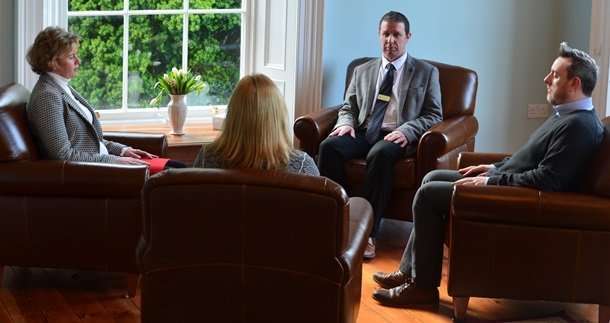Many people contemplate entering treatment for addiction in a state of high anxiety
They want it all to consist of personal attention, specifically one-to-one therapy. No need for a group they say. Recovery should be through self-discovery from within, not through the intrusion of judgemental and ill-informed third parties. New treatment centres are springing up everywhere helping such people to have treatment, without the need to mix with “the group”.
This may not be surprising, given the anxiety that most are feeling, but it is wrong. Many addicts have become isolated, even agoraphobic, as a result of addiction and the prospect of baring their souls in front of a bunch of strangers is terrifying. But recovery from addiction requires change and change itself requires taking a risk.
A lot of this fear of the group is due to personal circumstances.
If your background is one of above-average wealth, you will probably be used to private health care, where a single room and a personal relationship with a specialist consultant is the minimum expected for most medical procedures. A lot of newcomers to addiction recovery are preconditioned by previous hospital experience in this way.
I recently discussed this with a patient from Saudi Arabia who by his own admission, had lived such a privileged life that he ‘never had to wash a coffee cup’ before he entered treatment. All credit to him that he fully embraced the therapeutic community and the group.
My patient explained the difficulties that his background had posed for him – great wealth separates you from everyday dealings with ordinary people – shopping, ordering, making travel arrangements, that sort of thing; you pay other people to do that. If you are not working either, you can find yourself very cut off from the masses.
What this means for a certain fairly select group of privileged people is that they are preconditioned to handling a problem by the method of finding the best possible person to solve it for them, money no object; their wealth enables them to pass on the responsibility. This is not criticism but fact, that is how we would all approach dealing with any life threatening disease if we had the means. The point however is that it does not help recovery from addiction, where taking personal responsibility is absolutely crucial.
So what are the benefits of group therapy?
Most people would cite several that are common to any kind of group or community support (you are not alone), a place to express yourself and to validate your views and opinions, to learn to relate to others through trial and error, to learn about yourself (the group ‘holds up a mirror’).
These are all true. I think the really important benefits of exposing oneself to the group are as follows:
Trust and Reality
Group dynamics allow the members to become vulnerable to each other and so to trust one another with very personal material. This is a vital part of self-discovery if it is going to go beyond the superficial and is particularly effective when dealing with denial, the bugbear of so many addicts.
Very few of us truly know the effect that we have on others and addiction amplifies this lack of awareness.
Group members give constructive feedback to each other and so learn in an experiential way how their behaviour impacts people around them. At the same time, they find their own voice.
Power of Example
Insight into a problem like addiction is important but when you actually see another person working on themselves and succeeding in making changes, it has a hugely powerful effect. Putting education into practice is what really counts. Again, seeing peers at different stages of recovery and identifying with their struggles and achievements can give great insight and encouragement.
Recovery Culture
The group introduces newcomers to a new language, a new philosophy and a new set of values.
Peer pressure becomes a positive factor in encouraging individuals to conform to recovery. Healthy relationships are established in this way that introduces them to the wider world of the fellowships when they leave treatment (a fellowship meeting is itself a form of group therapy). Recovery means that your life changes and thus your lifestyle changes, the gentle and positive influence of the peer group is where this all starts.
‘AA teaches us a lesson which professional therapists have been slow to learn: that the interaction of the group – positive, task-oriented and homogeneous – is crucial to recovery.’*
We all know what that moment is like just before we dive into a swimming pool for the first time, yet by doing it, we experience a healthy and enjoyable experience. Group Therapy shouldn’t be feared, but instead embraced as an essential part of treatment.
Christopher Burn is a psychotherapist and author with a keen interest in addiction recovery. His book of daily meditations, Poetry Changes Lives, is available on Amazon.
Reference: *The Healing Bond – Treating Addictions in groups, by R.S. Rogers and C.S. McMillin, W.W. Norton and Co, 1989. Chapter 8, page 154.



